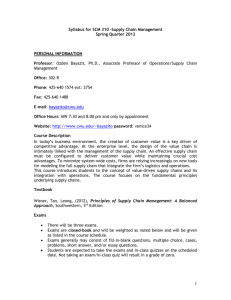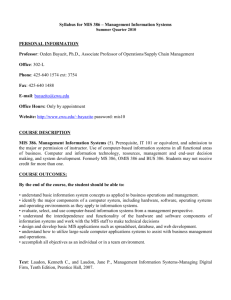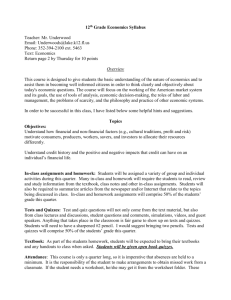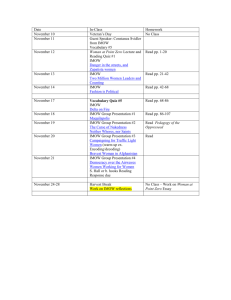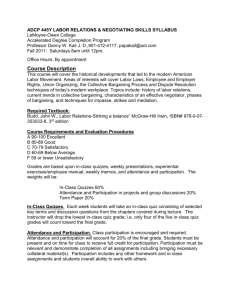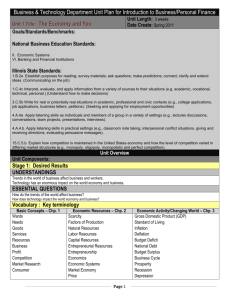OPERATIONS MANAGEMENT
advertisement
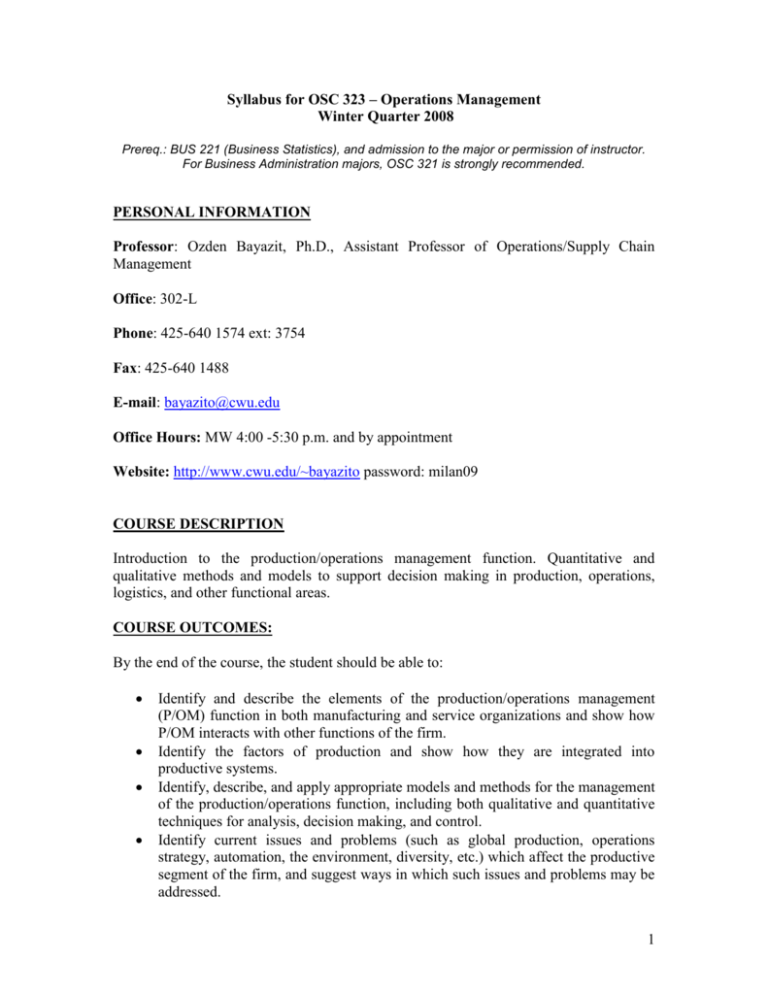
Syllabus for OSC 323 – Operations Management Winter Quarter 2008 Prereq.: BUS 221 (Business Statistics), and admission to the major or permission of instructor. For Business Administration majors, OSC 321 is strongly recommended. PERSONAL INFORMATION Professor: Ozden Bayazit, Ph.D., Assistant Professor of Operations/Supply Chain Management Office: 302-L Phone: 425-640 1574 ext: 3754 Fax: 425-640 1488 E-mail: bayazito@cwu.edu Office Hours: MW 4:00 -5:30 p.m. and by appointment Website: http://www.cwu.edu/~bayazito password: milan09 COURSE DESCRIPTION Introduction to the production/operations management function. Quantitative and qualitative methods and models to support decision making in production, operations, logistics, and other functional areas. COURSE OUTCOMES: By the end of the course, the student should be able to: Identify and describe the elements of the production/operations management (P/OM) function in both manufacturing and service organizations and show how P/OM interacts with other functions of the firm. Identify the factors of production and show how they are integrated into productive systems. Identify, describe, and apply appropriate models and methods for the management of the production/operations function, including both qualitative and quantitative techniques for analysis, decision making, and control. Identify current issues and problems (such as global production, operations strategy, automation, the environment, diversity, etc.) which affect the productive segment of the firm, and suggest ways in which such issues and problems may be addressed. 1 Recognize when it is appropriate to apply various analytic models for production systems and system elements. These are the decision making models of production and operations management. Textbook Krajewski, Ritzman, & Malhotra, Operations Management: Process and Value Chains, Prentice-Hall, 8th Edition, 2007. Exams Exams will be weighted as noted below and will be given as listed in the course schedule. Exams generally may consist of fill-in-blank questions, multiple choice, cases, problems, short answer, and/or essay questions. Exams ( 20% each) In-class quizzes (in total) Homework Assignments Class project Participation + Attendance 60% 8% 10% 15% 7% Final grade allocation 93% - A (4.0)/ 90% - A- (3.7) 87% - B+ (3.3)/ 83% - B (3.0)/ 80% - B- (2.7) 77% - C+ (2.3)/ 73% - C (2.0)/ 70% - C- (1.7) 67% - D+ (1.3)/ 63% - D (1.0)/ 60% - D- (0.7)/ 60% - F (0.0) Students are expected to take the exam on the scheduled date. If a student is unable to be present in class when an exam is scheduled because of an emergency situation, it is the student’s responsibility to contact the instructor in advance. Otherwise no makeup tests. Student Responsibilities The student is responsible for all assigned readings and internalizing all the material presented in class, which may or may not originate from the textbook. The student is responsible for the material covered in the lectures, assigned textbook readings, and case studies examined in class. Participation and Attendance Students who do not attend lectures cannot get participation points (and attendance credit as appropriate) during that class period. All requests for excused absence must be in advance. The instructor may deduct up to 25 percent from the attendance and participation portion of a grade for each incident. There will be also strong correlation between the problems done in class and the problems used on the assignments and exams. Assignments The student is responsible for submitting the individual/group assignments when scheduled by the instructor. There will be in-class and off-class assignments. Absence from class does not excuse the student from any in-class quizzes or any assignments made during the class period. A student who misses the class should check with the instructor to determine if an assignment was made during the class was missed. All 2 homework assignments must be typed and the student/group name, submission date, and title of the homework subject should be included. When a group project is assigned, each group is required to return one written report to the instructor. All late assignments within one week of the due date will be graded out of 5 instead of 10. All homework assignments grading is done by 1-10 scale as following: 10 9 8 7 and below Excellent Very good Good Poor/unsatisfactory Class Project The students are expected to form a group with 3-4 persons and then to complete a class project. The objective of this assignment is to have your group visit a product or service organization, analyze it from an operations point of view, and report your results. You will be responsible for submitting a 5-8 page written analysis of your results (Due March 8th). You are also expected to make a short oral presentation (10-15 minutes) of your results (Presentations: March 8th). Grading for Class Project will be based on the following: Written analysis (80%) and presentation (20%). Project Details Visit a product or service organization as a group. Interview with the operations and/or production manager to compile information about the company's operations strategy, quality control methods, processes, inventory planning methods, forecasting techniques, location decisions, layout formats, etc. Your report should include the following: -Company background (when it started, how many employees it has, which industry it is in, etc.). -Your report should also address at least five of the following issues (You might choose to concentrate on just one topic in greater detail): o o o o o Operations strategy/competitive basis (company's competitive priorities, how company do compete with its competitors, what the company's strengths and weaknesses are over its competitors, etc.) Products/services (features, classification, design) Processes which create/deliver the products/services (classification, features, design) Capacity planning Facility Location (what the factors affecting the company's location decisions are , how the company plans its location for a new facility, etc.) 3 o o o o o o Facility Layout Inventory planning/management Supply chain management (how the company works with its suppliers, whether they do have an integrated supply chain management approach, etc.) Quality management/control (Whether they do implement TQM philosophy, how they do control and maintain quality within the organization, which quality tools they do use (Pareto, checklists, cause-effect diagrams, flowcharts, etc.), whether they do implement Six-sigma philosophy, whether they do use statistical control charts (R charts, X-bar charts, etc.) Operations planning and control (JIT implementation, etc.) Forecasting Services Available for Physically Challenged Students: If you are physically challenged, please notify the instructor. The instructor and CWU will do their best to provide such services. COB Policy on retake courses: Please note that only one retake of all Bus. Admin. courses. Graduation Deadlines: Planning to graduate in June? The deadline to apply is the second Friday of Winter quarter. Planning to graduate in August? The deadline to apply is the second Friday of Spring quarter. Planning to graduate in December? The deadline to apply is the second Friday of Summer quarter. Planning to graduate in March? The deadline to apply is the second Friday of Fall quarter. 4 Tentative Course Outline Date of 01/05/08 01/12/08 01/19/08 Topic (s) Introduction to the class Chapter 1: Operations as a Competitive Weapon In-class quiz 1 Chapter 2: Operations Strategy In-class quiz 2 Chapter 4: Process Strategy In-class quiz 3 Exam 1 Chapter 5: Process Analysis In-class quiz 4 Chapter 6: Process Performance and Quality 01/26/08 In-class quiz 5 02/02/08 02/09/08 Exam 2 Chapter 10: Supply Chain Strategy In-class quiz 8 02/16/08 Chapter 11: Location In-class quiz 9 Chapter 12: Inventory Management Chapter 8: Process Layout In-class quiz 6 Chapter 9: Lean Systems In-class quiz 7 Chapter 12: Inventory Management (cont’d) In-class quiz 10 02/23/08 5 03/01/08 03/08/08 Chapter 13: Forecasting In-class quiz 11 Group Project Study Time Exam 3 Group Project Presentations Please note that this is a tentative outline and is subject to changes during the quarter. 6
